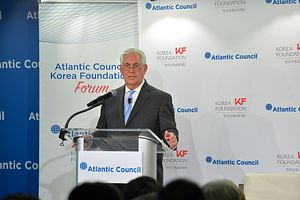U.S. Secretary of State Rex Tillerson had a few things to say about U.S . policy toward North Korea on Tuesday that piqued some interest. Speaking at the Atlantic Council, Tillerson generated quite a few headlines for stating that the United States was open for talks with North Korea “without precondition.” (Never mind that the White House appeared to contradict him on that point just hours later, saying that while that may be Tillerson’s view, President Donald Trump’s views on North Korea “have not changed.”)
Tillerson’s remarks certainly are an attempt to lower the temperature publicly with North Korea and are a welcome divergence from the threatening ticking-clock rhetoric favored by other senior Trump administration officials (most notably, H.R. McMaster, Trump’s adviser on national security affairs). A closer look at what the secretary of state had to say on Tuesday, however, shows that there’s little new here.
The core of what Tillerson outlined on Tuesday is simply a restatement of a position that he and U.S. Defense Secretary Jim Mattis first outlined together in an op-ed in the Wall Street Journal called “We’re Holding Pyongyang to Account.” That op-ed was significant, as I noted at the time, as it was the first credible high-level indicator that the Trump administration was willing to set aside denuclearization-acceptance preconditions for talks with North Korea, which were always a nonstarter for Pyongyang:
The U.S. is willing to negotiate with Pyongyang. But given the long record of North Korea’s dishonesty in negotiations and repeated violations of international agreements, it is incumbent upon the regime to signal its desire to negotiate in good faith. A sincere indication would be the immediate cessation of its provocative threats, nuclear tests, missile launches and other weapons tests.
On Tuesday, Tillerson outlined a similar case. Referring to “era of strategic accountability” (a new catch-phrase for the Trump administration’s North Korea policy yet again), Tillerson said that while the end goal for the United States remains the “complete and verifiable denuclearization of the Korean Peninsula,” Washington would be willing to get in a room with North Korea and have open-minded talks:
When do the talks begin? We’ve said from the diplomatic side we’re ready to talk anytime North Korea would like to talk, and we’re ready to have the first meeting without precondition. Let’s just meet and let’s – we can talk about the weather if you want. We can talk about whether it’s going to be a square table or a round table if that’s what you’re excited about. But can we at least sit down and see each other face to face? And then we can begin to lay out a map, a roadmap of what we might be willing to work towards.
What’s more, Tillerson offered what is, to my recollection, the most direct repudiation of denuclearization preconditions for talks with North Korea that we’ve seen from a senior U.S. official in years: “I don’t think – it’s not realistic to say we’re only going to talk if you come to the table ready to give up your program. They have too much invested in it.”
Between all of this, Tillerson clearly appears to be intent on communicating that there’s a diplomatic-leaning, conciliatory approach that the Trump administration is willing to entertain with North Korea. But, as with anything led by Rex Tillerson, the problem will be credibility. This secretary of state simply is unlike his predecessors. He’s shown himself to be incapable of driving the policy conversation in the White House and has been mostly on the sidelines on North Korea policy. The president, too, has directly repudiated Tillerson’s previous attempts at diplomacy, telling him that he was “wasting his time trying to negotiate with Little Rocket Man.”
So, with all this in mind, Tillerson’s latest statement is probably going to end up inconsequential in the larger scheme of things. The silver lining, if there is one, is that U.S.-North Korea communication remains ongoing and talks are happening, even if they’re occurring at a lower level, led primarily by the U.S. Special Representative for North Korea Policy Joseph Yun.
There’s little evidence that North Korea is currently in a position where it’d seek to enter into more ambitious talks at a higher level. Its latest successful intercontinental-range ballistic missile flight test showed that it continues to make steady progress with its strategic deterrent despite the new sanctions. Despite Tillerson’s best efforts, the U.S. will likely just be stuck uneasily muddling forward with North Korea as it has all year.

































